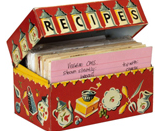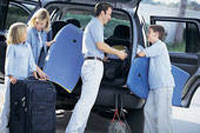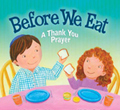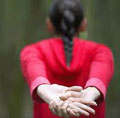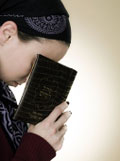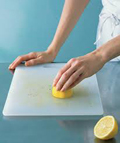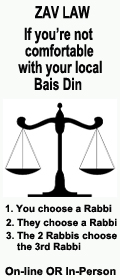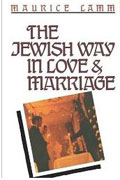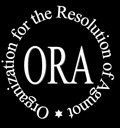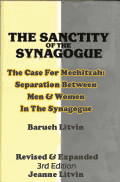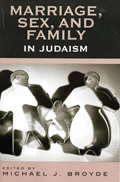Q & A

Every Day Family Questions & Answers
♦♦♦♦♦
Page 5 B - Keeping Kosher | Page 6B - Keeping Kosher
Milk & Meat
♦♦♦♦♦
I am taking a cooking class.
I know that I am not permitted to cook meat & milk together.
May I put the ingredients together & ask a non-Jew to turn on the oven?
- No, this is not permitted.
- One may not ask a non-Jew to perform an action that one is prohibited from doing
themselves (see Shulchan Aruch YD 297:4). - This is known as amira l’akum (literally, asking a non-Jew) & it is a Rabbinic prohibition.
- Even if the meat is neveila (non-kosher meat), it is still strictly forbidden.
- Although in a previous Halacha we saw that there is a disagreement about whether one
may benefit from neveila (non Kosher dead animal) that was cooked with milk & the
Rambam was lenient, that leniency is limited to the prohibition of benefiting from meat
& milk. - Regarding the prohibition of cooking meat & milk, even the Rambam agrees that the Torah prohibition still applies to cooking neveila with milk.
I am taking a cooking class where I don't have to cook.
I am required to prepare a dish that contains milk & meat.
However, I must marinate beef in a dairy dressing.
Is this permitted?
- Yes because the prohibition of basar b’chalav is only to cook milk & meat.
- Other combinations which do not involve heat are permitted.
- Therefore, one may soak meat in milk even for more than 24 hours & one may even salt
milk & meat together. - One may also benefit from these combinations.
- Obviously, one would not be permitted to sample their work, since there is a Rabbinic
prohibition to eat meat that came into contact with milk. - However, the prohibition of cooking meat & milk does not apply.
- If milk and meat were soaked together for 24 hours it would be forbidden to cook the meat,
even if the milk was washed off. - Taste from the milk is absorbed inside of the meat & it is prohibited to cook meat with
absorbed taste of milk.
My office has a non-kosher toaster oven.
I see people heating pepperoni pizza (basar b’chalav) in it.
Am I permitted to heat up my sandwich in this toaster
if I double wrap my food in two layers of aluminum foil?
- The Rama (YD 87:4) writes that one may not stoke the flame under a pot that belongs
to a non-Jew. - This is because there is a concern that the pot may have previously been used with meat
& with milk. - By stoking the flame one is drawing out the taste that was absorbed in the walls of the pot
& cooking it in the water. - Although the meat & milk were already cooked, it is forbidden to further the cooking &
the same concern would exist with a toaster oven. - There can be drips of cheese or other foods that are forbidden because of basar b’chalav
on the toaster tray or stuck to the walls of the oven. - Unless the toaster is cleaned before using, one might be further cooking the basar b’chalav
& this is forbidden. - Therefore, it is not recommended for one to use a non-kosher toaster even if the food is
double wrapped, unless it is first cleaned.
Can I place double wrapped food in a dirty, non-kosher microwave oven,
or must I be concerned that I might be cooking basar b’chalav?
- In the previous Q & A, we discussed the concern with turning on a dirty, non-kosher toaster oven that was splattered with basar b’chalav.
- Does this concern also apply to a microwave oven?
- Perhaps one could argue that since a microwave does not cook with fire, it is not included
in the prohibition of cooking basar b’chalav. - Igros Moshe (OC 3:52) writes, regarding cooking on Shabbos, that a microwave is the
same as cooking with fire, but perhaps even he would agree that basar b’chalav is
different. - However, even if we assume that cooking basar b’chalav in a microwave is forbidden,
there is still reason to permit using a non-kosher microwave, when food is double wrapped
because of the difference between how a conventional toaster oven works & how a
microwave oven works. - The toaster oven itself gets hot & heats up all the food that is inside.
- All the crumbs & food residue inside a toaster oven will get hot & be cooked.
- However, the walls of a microwave do not heat up the food.
1. A microwave works by heating up the water molecules inside the food. - 2. Dry residue inside a microwave oven will not get hot &will not be cooked.
- 3. One should brush out the microwave so that there are no large crumbs that might get
heated, but one need not clean the microwave, since the dry residue inside the
microwave will not get cooked.
Cold milk spilled into an empty fleishig pot.
The milk sat in the pot for more than 24 hours.
Does the pot need kashering?
- Yes. If a liquid is contained in a vessel for 24 hours it is referred to as kavush (soaking)
(Shulchan Aruch Y.D. 105:1). - Ordinarily, a cold liquid is not absorbed into the walls of a pot, but after 24 hours, absorption
does occur. In our case, milk will be absorbed into the fleishig pot after 24 hours & the pot
must be kashered before it can be used. - If the pot is metal, the pot can be kashered with hagalah, by immersing the pot in boiling
water. - If the pot is made of clay (e.g. earthenware, ceramic), it cannot be kashered with hagalah.
- Ceramic can be kashered in a potter’s kiln, but this is not practical for most people.
- An unkashered pot should not be used, even to cook pareve foods (Shach YD 93:3).
I discovered that milk spilled in my refrigerator.
I don’t know when this happened but I found milk in my pot roast.
It is possible that the milk has been there for more than 24 hours,
in which case the milk would be absorbed in the pot.
I threw out the meat. Do I need to kasher the pot?
- In this case, the pot does not require kashering.
- The Rama (YD 105:1) explains that when there is a question as to whether meat & milk
were kavush (soaked together for 24 hours), we are lenient. - This is because meat & milk that were kavush together are prohibited only on a Rabbinic
level. - The Torah prohibition is violated only if milk is cooked together with meat.
- For Rabbinic restrictions we apply the principal of 'safek d’rabbanan l’kula' (we are
lenient if there is a doubt involving a Rabbinic prohibition). - Since in the case above there is uncertainty whether kavush occurred, the pot need not
be kashered. - Nonetheless the meat should not be eaten, because cooked meat is soft & absorbs
milk even before 24 hours have transpired.
I have heard that some people wait past 5 or past 5 & a half hours
between meat & milk. What is the basis for this?
- Shulchan Aruch (YD 89:1) writes that one must wait 6 hours between meat & milk &
many poskim understand this to be a precise measure of time (see Ginas Veradim –
Gan Hamelech 154). - However, others point out that the Rambam (Hilchos Maachalos Assuros 9:28) writes
that one must wait 'approximately 6 hours,' which implies that 6 hours is not an exact time. - Furthermore,the Meiri (Magen Avos, siman 9; p. 47) writes that one must wait five or six hours. Rav Ovadya Yosef, zt'l (Yabia Omer YD 1:4:13) cites these last two points &
also notes that before the advent of clocks, people would estimate the 6 hours. - Now that we have clocks it is best to wait 6 complete hours, but in cases of necessity,
Rav Ovadya allows being lenient after 5 & a half hours. - Rav Shlomo Zalman Auerbach, zt”l is quoted in the journal Moriah (Teves 5756, p. 79)
that one should wait the full 6 hours, but those who have the practice of waiting into the
6th hour (past 5 hours) have what to rely on. It is also well known that Rav Aharon Kotler,
zt'l allowed dairy meals to be served in Beth Medrash Govoha after 5 hours & 31 minutes
(cited in Shu't Ohr Yitzchak vol. 1, Yoreh Deah 4).
Every Day Family Questions & Answer
-
Page 1 - Family | Page 1 B - Family | Page 2 - Family
Page 2B - FamilyPage 2C - Family | Page 2D - Family - Cats & Dogs
Page 3 - Family - Kosher | Page 3B - Family - Kosher
Page 4B - Family Kosher | Page 4 - Family - Medical | Wine
Page 5 - Family - Harsh Circumstances | Page 6 - Dire Circumstances
Page 6 - Milk & Meat
Q & A Shabbas 1 | Q & A Shabbas 2 | Q & A Shabbas 3
Q & A Davening | Q & A Business 1 | Q & A Business 2info@darcheinoamglenbrook.org
♦♦♦♦♦
Copyright © 2012 -2018 KosherWoman.com
All rights reserved


